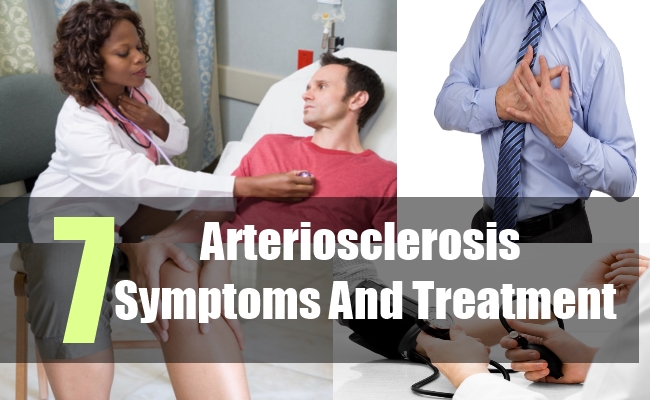Arteries are the blood vessels carrying nutrients and oxygen from the heart to all over the body. When your arteries are healthy they are elastic and flexible. When your arteries thicken and harden it is called as arteriosclerosis. Hardening and thickening of arteries is a slow process occurring over time, often starting in childhood. Atherosclerosis is a specific form of arteriosclerosis, caused due to build-up of cholesterol and fats on the walls of your arteries (plaque).
Exact cause is unknown. But the initiating factor is usually injury or damage to the inner lining of the artery, caused by increased blood pressure (hypertension), diabetes, smoking, and high cholesterol. Then at the site of damage, cholesterol and cell debris accumulate. This hardens and narrows the arteries. Symptoms can vary from chest pain and weakness to paralysis and kidney failure.
Symptoms Of Arteriosclerosis
Symptoms are absent if the arteriosclerosis is mild. Symptoms start appearing only when the artery is so much clogged or narrowed that the blood supply through it to the tissues and organs is impeded.
Chest Pain (Angina)
If the blood vessels supplying the heart muscle are affected, it can decrease the supply of blood and oxygen to heart muscle. Oxygen is necessary for the heart muscle to contract properly. So, when there is an imbalance between oxygen demand and supply to the heart muscle, chest pain can occur.
This pain can be stationary or radiate to jaw, neck, left shoulder and arm. It tends to occur initially upon exertion. Later it may occur even at rest, usually signaling a heart attack.
Weakness Or Paralysis Of Muscles
If the blood vessels supplying the brain are affected, then it can cause weakness or numbness in arms and/or legs. You may have difficulty in speaking or your speech may be slurred. Muscles in your face may be drooping. Initially, these symptoms occur transiently, referred to as transient ischemic attack. If you do not seek treatment at this stage, full-blown paralysis may develop (stroke).
Pain In The Legs
If the arteries in the leg are affected, there can be pain in the legs when walking. This is called as intermittent claudication because it gets relieved upon resting. It occurs because the blood vessels cannot supply enough blood to the leg muscles to meet the increased demand for oxygen by the leg muscles while walking.
Other Symptoms
If arteries supplying kidneys are affected, you can develop high blood pressure. It can even progress to kidney failure, with precipitous fall in urine output. When the arteries supplying genitalia are affected, you may have difficulty in sexual intercourse and even impotence if you are a male. In females, sexual intercourse will be less pleasurable.
Treatment Of Arteriosclerosis
Lifestyle changes, such as regular exercise and healthy diet, are often preferable to halt the progression of the disease. Some may require medications, which can not only slow down the disease but may also reverse the disease. Surgery may be necessary in some cases.
Lifestyle Changes
You should stop smoking if you are a smoker. You should get regular exercise. Eat a diet low in fat and high in fiber. Lose weight if you are obese. Manage the stress in your life through relaxation techniques, yoga and meditation. All these measures can go a long way in keeping the disease in check, and giving you a fair chance of reversing the disease process.
Medications
Several medications are available that can lower the cholesterol level in your body, and thereby slow down or even reverse the disease process. Such medicines are fibrates and statins.
You may be prescribed aspirin, to prevent platelet clumping and blood clot formation. Other medications depend on your specific symptoms, such as antihypertensives if you have high blood pressure.
Surgery
Surgery is necessary in severe cases, such as those at high risk for heart attack or stroke. If the arteries in heart are getting blocked, the treatment is with angioplasty and stenting. In more severe cases, coronary bypass surgery is necessary.
Endarterectomy, involving surgical removal of fat deposits from the arterial wall, is necessary if arteries present in neck (carotid arteries) or leg are blocked.
Caution: Please use Home Remedies after Proper Research and Guidance. You accept that you are following any advice at your own risk and will properly research or consult healthcare professional.








